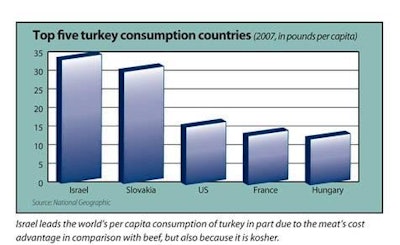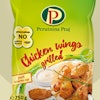
Pale, soft and exudative (PSE) meat – meat that is pale in colour, forms soft gels, and has a decreased ability to hold water – is a problem often associated with pork. However, according to researchers, it is increasingly becoming a challenge for some poultry producers as well, particularly in the turkey industry.
Top five turkey consumption countries
PSE is not a problem with whole turkeys, but it is impacting further processed products, such as sliced turkey deli meats, particularly whole-muscle deli rolls or loaves. In these whole muscle products, there is less opportunity for protein extraction due to decreased surface area compared to comminuted (ie chopped and formed) products.
There is also decreased water binding in these products due to protein damage caused by the development of PSE. Therefore, the damaged proteins in PSE meat have a reduced ability to bind, hold water, and maintain their texture.
According to researchers Christine Alvarado, an associate professor in the Animal and Food Sciences Department at Texas Tech University, and Casey Owens, an associate professor in the Department of Poultry Science at the University of Arkansas, a host of causes may play a role in the growing incidence of PSE meat in turkey plants.
Finding an effective means to reduce levels of PSE turkey meat would have a significant economic impact for the typical turkey producer. Taking the US as an example, Alvarado and Owens claim that the average producer could be losing from US$2 million to US$4 million annually to the problem – a level which, if correct, would put annual losses to the US turkey industry due to PSE meat at more than US$200 million.
And this is a pattern that, without a solution to PSE, could be repeated in other markets as turkey increases in popularity as a meat to be consumed year round and not simply as a food for celebrations.
Stress
Professor Alvarado says: “PSE meat results from an animal’s inability to tolerate stress. The root of stress intolerance may be genetic, as it is in swine, where the specific genetic mutation associated with stress susceptibility is known. But to date, we lack sufficient evidence either to support or refute genetic mutation as the underlying cause for the same condition in turkeys.”
Whether or not there is a genetic basis for increased stress intolerance, taking an active, holistic approach to reducing pre- and post-mortem stress levels will be key to producers in decreasing levels of PSE turkey meat in their plants.
Professor Owens comments: “Turkeys and swine are both subjected to similar environmental stress, such as heat stress, pre-slaughter handling practices and transportation. These can lead to a higher level of PSE in these animals. Therefore finding ways to lower those stress levels will be critical to reducing PSE.
“For example, newer techniques in gas stunning methods where turkeys are stunned while on the truck after it arrives at the processing plant, rather than after they have been placed on the line, may help to reduce PSE by decreasing the human-handling component.”
Environmental factors in the post-mortem environment can also contribute to PSE, even in normal, non-stressed animals, according to the researchers. For example, inadequate chilling, which turkeys are susceptible to given their relatively large body size and muscle mass, can contribute to PSE.
Solutions
Current solutions to PSE are limited, but new methods to reduce its prevalence are under examination.
One approach might involve developing a sorting process in which meat having a higher probability of developing PSE would be directed away from whole-muscle products toward formulations incorporating marinades containing functional ingredients, such as salt, phosphates, starches or gums. This sort of sorting process might be on characteristics such as meat colour and pH. Similar automated pH assessment systems are already in development in the pork and beef industries for the same purpose of sorting meat for optimum meat function. Equipment to assess colour online is already available and could be used for sorting.
What’s critical in any approach to tackling the turkey industry’s growing incidence rate of PSE is that it be holistic, taking steps to reduce the many pre- and post-mortem stresses associated with production,” adds Professor Alvarado.




.jpg?auto=format%2Ccompress&fit=crop&h=167&q=70&w=250)














